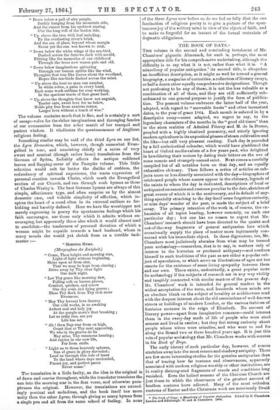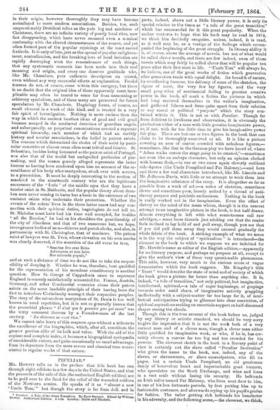THE BOOK OF DAYS.*
THIS volume is the second and concluding instalment of Mr. Chambers' gigantic Almanack, for such is, perhaps, the most appropriate title for his comprehensive undertaking, although the difficulty is to say what it is not, rather than what it is. " A miscellany of popular antiquities," its second title, is altogether an insufficient description, as it might as well be termed a general biography, a magazine of curiosities, a collection of literary essays, or half a dozen other equally comprehensive designations. Though not professing to be any of these, it is not the less valuable as a combination of all of them, and they are still sufficiently sub- ordinated to one general purpose to justify the form of publica- tion. The present volume embraces the latter half of the year, adapted, with regard to " moveable feasts" and other inconstant dates, to the year of grace 1864. Each month is ushered in by a descriptive essay—more adapted, we regret to say, to the legendary characters of the months in the "good old times" than to the stern realities of Admiral Fitzroy and M. de la Drome, peopled with a highly idealized peasantry, and utterly ignoring modern agriculture in its unpoetical phases of steam cultivation and the like—but still very pleasant reading. Each day is preceded by a full ecclesiastical calendar, which would have gladdened the heart of Oxford mediaevalists of a few years past, who delighted in bewildering their seniors by dating their letters on the eve of some remote and strangely-named saint. Next comes a carefully compiled list of all notables born on that day, and an equally exhaustive obituary. Then follows a series of articles on sub- jects more or less directly associated with the day—biographies of celebrated people whose names appear in the obituary, legends of the saints to whom the day is dedicated, descriptions of local or antiquated ceremonies and customs peculiar to the date, sketches of great events of which it is the anniversary, and in default of any- thing specially attaching to the day itself some forgotten curiosity, or nine days' wonder of the past, is made the subject of a brief essay. The primary intention of the work is, of course, the ex- haustion of all topics bearing, however remotely, on each one particular day ; but one has no reason to regret that Mr. Chambers' research should have been directed to the quaint and out-of-the-way fragments of general antiquarian lore which occasionally supply the place of matter more legitimately con- nected with his immediate object. In these digressions, too, Mr. Chambers most judiciously abstains from what may be termed pure archaeology—researches, that is to say, in matters only of interest to the historian or professed antiquary—and confines himself to such traditions of the past as are either a popular sub- ject of speculation, or which serve as illustrations of ages not too remote for the existence of some living sympathy between them and our own. There exists, undoubtedly, a great popular taste for archaeology if the subjects of research are in any way visibly and tangibly connected with similar matters of the present day. Mr. Chambers' work is intended for general readers in the widest acceptation of the term, and hundreds whose minds are an absolute blank on the subject of heraldry or architecture read with the deepest interest about the old associations of well-known streets or buildings of modern London, or the various fashions of feminine costume in the reign of Elizabeth. No amount of literary power—apart from imaginative romance—could interest them in the every-day mode of life of people who wore steel armour and lived in castles ; but they feel strong curiosity about people whose wives wore crinoline, and who went to and fro along the Strand two or three hundred years ago. It is just this vein of popular archaeology that Mr. Chambers works with success in his Book of Days.
The early history of each particular day, however, of course stretches away into the most remote and shadowy antiquity. There are few more interesting studies for the genuine antiquarian than that of tracing how far customs and observances, apparently associated with modern religious worship or other institutions, are
in reality disintegrated fragments of creeds and conditions long vanished. Even the holiest seasons of the Christian Church are just those to which the observance of the greatest amount of. heathen customs have adhered. Many of the most orthodox customs of Easter and the Christmas week are notoriously Druid * The Book of Days; a irises-I:any o/ Popular Anliquilies. Edited by R. Mambas London and Edinburgh: W. and B. Cbambere. 1564. in their origin, however thoroughly they may have become assimilated to more modern associations. Besides, too, such unquestionably Druidical relics as the yule log and mistletoe of Christmas, there are an infinite variety of purely local rites, now fast disappearing, which have never assumed even a nominal conformity with the altered circumstances of the season, and yet often formed part of the popular rejoicings at the most sacred festivals. It is only of late, just as the spread of popular enlighten- ment, centralization, and the breaking into of local isolation are rapidly destroying even the remembrance of such things, that any systematic research has been made into their real meaning and origin, and every one deserves gratitude who, like Mr. Chambers, puts authentic description on record, even without any very successful efforts at explanation. Feudal tenures do not, of course, come within this category, but there is no doubt that the original idea of those apparently most inex- plicable may often be traced to some far from unmeaning or arbitrary symbolism, and of these many are preserved for future speculation by Mr. Chambers. Hagiology forms, of course, no small element in a work of this kind, and is treated in a very fair spirit of investigation. Nothing is more curious than the way in which the ancient heathen ideas of good and evil genii became merged in the medheval doctrines of guardian angels, and subsequently, as perpetual canonizations created a separate spiritual hierarchy, each member of which had an earthly history and secular associations, in the belief in patron saints. The reasons which determined the choice of their saint by parti- cular countries or classes seem often most trivial and bizarre. St. Sebastian, besides being honoured asthe patron saint of Portugal, was also that of the useful but undignified profession of pin- making, and the reason gravely alleged represents the latter honour as having been conferred upon him on account of the re- semblance of his body after martyrdom, stuck over with arrows, to a pincushion. It must be deeply interesting to the section of mankind in the nineteenth century who are the legitimate successors of the " fools '' of the middle ages that they have a tutelar saint in St. Mathurin, and the popular theory about drun- ken men never coming to harm has a basis in the existence of two eminent saints who undertake their protection. Whether the events of the saints' lives in the three latter cases had any con- nection svith their spiritual duties, hagiologists do not tell us. St. Nicholas must have had his time well occupied, for besides " all the Bussias," he had on his shoulders the guardianship of the city of Aberdeen and that of two numerous but, we hope, incongruous bodies of men—thieves and parish clerks, and also, in partnership with St. Christopher, that of mariners. The patron saint of lawyers was St. Yves, whose elevation on his own merits was clearly deserved, if the assertion of the old verse be true, " Sanctus No erat Brito
Advocates at non latro Res miranda popnlo,"
and at such a distance of time we do not like to take the respon- sibility of denying it. Whether be was, therefore, best qualified for the representation of his mundane constituency is another question. How St. George of Cappadocia came to represent England is scarcely satisfactorily accounted for. France, Austria, Germany, and other Continental countries chose their patron saints on the more laudable principle of their having been the first to introduce Christianity amongst their respective peoples. The story of the miraculous martyrdom of St. Denis is too well known to need repetition, but it is not so generally known that the proverbial phrase "11 n'est que le premier pas qui coute" was the witty comment thereon by a Frenchwoman of the last century " La distance ne vaut We cannot take leave of this magnum opus without a tribute to the excellence of the biographies, which, after all, constitute the greater portion alike of its bulk and value. With the aid of the copious and complete index, it becomes a biographical cyclopredia of considerable extent, and gains occasionally no small advantage, from its departure from the more severe and classical tone neces- sitated in regular works of that nature.































 Previous page
Previous page